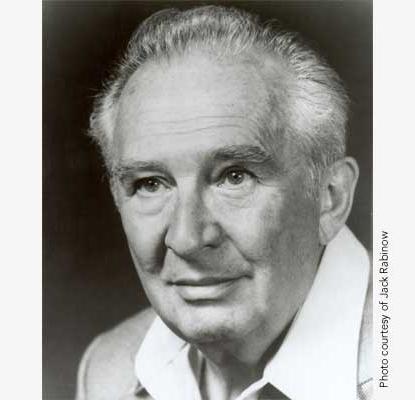Jacob Rabinow
Entering the engineering field as a Jewish man during the Great Depression, Jacob Rabinow was advised to seek another career—but his tenacity and love for inventing drove him to pursue his dreams. Rabinow was recognized as the 1998 Lemelson-MIT Lifetime Achievement Award honoree for rising above his obstacles and succeeding in a life-long career of inventing that benefited a range of industries and people.
Totaling 230 U.S. patents—Rabinow's inventions span many fields. Among them are the automatic letter-sorting machine for the U.S. Postal Service; automatic regulation of clocks and watches; the magnetic particle clutch used in cars and airplanes; straight-line phonograph; a new type of Venetian blind; optical character recognition machine; pick-proof lock; and a magnetic memory device (precursor to the modern hard disk drive).
Rabinow, who was inspired both by the science fiction of Jules Vernon and the mechanical automation of his father's shoe factory, began his career with the National Bureau of Standards (today known as the National Institute of Standards and Technology) in 1938. During World War II, Rabinow contributed to the development of the mechanical and safety aspects of the proximity fuse used in bombs, and improved guided missiles, which proved advantageous for the United States' front.
In 1954, Rabinow created Rabinow Engineering Company to provide consulting services. He returned to the National Bureau of Standards (NIST) in 1972, and officially retired in 1989. Today, his life's work is on display in the special dedicated Rabinow Room at the NIST Museum.
The Russian-born Rabinow emigrated with his family first to China and, finally, to Brooklyn, NY in 1921. He earned his BS in Engineering (1933) and MS in Electrical Engineering (1934) from City College of New York. Rabinow has received numerous awards, including The President's Certificate of Merit (1948). In 1990, he published Inventing for Fun and Profit. Rabinow died in 1999 at the age of 89.


